Bloat in dogs, medically known as gastric dilatation volvulus (GDV), is a potentially fatal condition. It occurs when a dog’s stomach fills with air, food, or liquid and then twists. The twisting cuts off the blood supply, leading to shock and, if untreated, death within hours. It’s a fast-moving condition that every dog owner should be aware of, especially if they have a Golden Retriever.
Golden Retrievers are among the breeds most susceptible to bloat due to their deep chests and genetic predisposition. As loving, energetic pets, their active lifestyles and inappropriate behaviors can contribute to this dangerous condition without you even realizing it.
The good news is that bloat can often be prevented with knowledge and proper care. In this guide, we’ll cover how to prevent bloat in dogs, with a special focus on Golden Retrievers. You’ll learn more about safe eating habits, training plans, water management, stress management, and the importance of veterinary checkups—all accessible to beginners. It’s worth taking care to protect your Golden Retriever’s Health. This blog will show you how to take preventive measures every day.
Contents
- 1 What is Gastric Diversion Volvulus in Golden Retrievers?
- 2 Why Golden Retrievers Are at Increased Risk
- 3 Feeding habits to Prevent Bloat
- 4 Timing of Meals and Exercise – Critical Prevention Tips
- 5 Stress and Anxiety – The Hidden Factors That Contribute to Bloat
- 6 Veterinary Checkups and Preventative Surgeries (if needed)
- 7 Checklist – Daily Habits to Prevent Bloat
- 8 Final Thoughts: Protect your Golden Retriever!
What is Gastric Diversion Volvulus in Golden Retrievers?
Bloat in Dogs, also known as GDV, is a dangerous and sometimes lethal sickness. It occurs when a dog’s stomach rapidly fills with air and twists. Gastric diversion causes stomach contents to become trapped and cuts off the blood supply to vital organs. Without immediate veterinary care, this may result in shock, tissue destruction, and even death. While bloat can occur in any dog, Golden Retrievers are especially susceptible. Therefore, prevention and attention are essential to their long-term health. There are two main types of bloat that Golden Retriever owners should be aware of:
- GDV (Gastric Dilatation-Volvulus) is the most severe and potentially fatal form. GDV often requires emergency surgery.
- Water Bloat, on the other hand, occurs when a dog swallows a large amount of water in a short period of time. While not always as dangerous as bloat, it can still be uncomfortable and worse if left untreated. Learn more about water bloat in dogs.
It’s important to recognize early signs and symptoms, such as a swollen abdomen, ineffective vomiting, restlessness, rapid breathing, or excessive drooling. These symptoms can develop quickly, and prompt action is essential when dealing with bloat in a Golden Retriever. To fully understand the causes of this dangerous condition, check out our in-depth look at the causes of bloat. Understanding these underlying causes is the first step of how to avoid Bloat in Dogs, especially in breeds like the Golden Retriever.
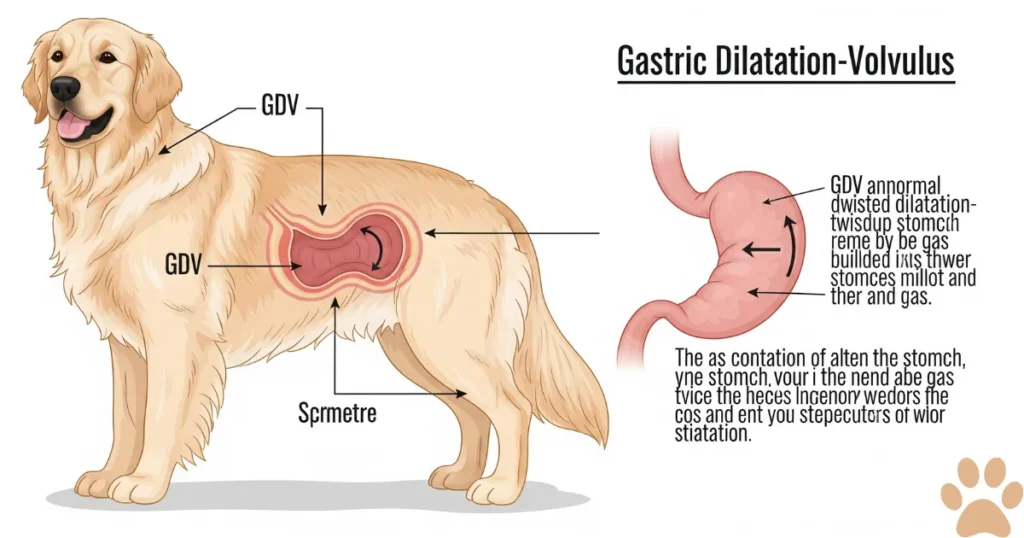
Why Golden Retrievers Are at Increased Risk
Golden Retrievers and Their Tendency to Bloat
Golden Retrievers are a popular breed known for their friendly nature, intelligence, and loyalty. Unfortunately, they are also prone to certain health issues, including bloat. When it comes to Golden Retriever health issues, bloat/GDV (also called gastric torsion) should be one of every owner’s top priorities.
Deep Chest Increases Risk
Golden Retrievers have a deep chest, which is strongly associated with an increased risk of GDV. Research shows that large breeds with deep chests are significantly more likely to suffer from bloat than breeds with wide, short chests. This body shape allows the stomach more room to move and rotate, especially when quickly filling with food, water, or air.
Genetic Factors and Inherited Risk
There is growing evidence that bloat may have a genetic component. Some studies suggest that dogs with close relatives who have had Gastric Dilatation-Volvulus are more likely to develop it. If your Golden Retriever has a family history of GDV or Bloat, it is especially important to take preventative measures.
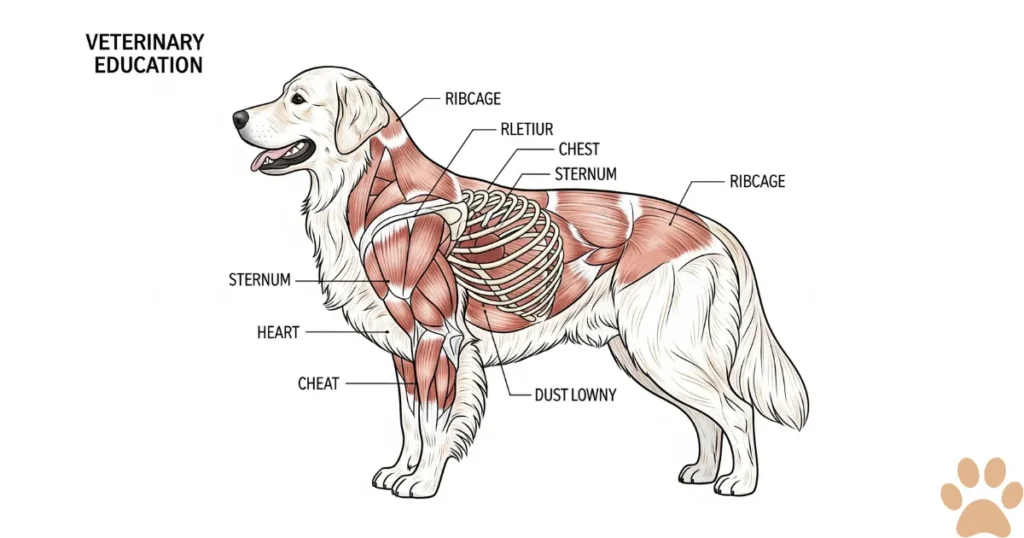
Feeding habits to Prevent Bloat
Feeding plays an important role in how to prevent bloat in dogs, especially in at-risk breeds like Golden Retrievers. Even a few simple changes to your Goldens’ feeding routine can significantly reduce the risk of Golden Retriever Bloat. Here are some evidence-based tips that all dog owners should follow.
Feed Smaller, More Frequent Meals
Feeding your Golden Retriever two to three small meals a day instead of one large one will help prevent rapid gastric distension and bloat. Large, but infrequent meals increase the risk of gastric dilation, which is a major factor in Gastric Dilatation-Volvulus (GVD).
Feeding smaller meals protects your dog’s digestive system and reduces the risk of bloat and abdominal pressure. It is one of the most effective measures on how to avoid bloat in dogs.
Avoid Eating Too Fast – Use Slow-Flow Feeders
Golden retrievers are typically very voracious eaters, but gulping down food too quickly can lead to excess gas in the stomach, one of the main causes of bloat. Using a slow-flow or puzzle feeder can help encourage slower food intake and better digestion.
These are especially helpful if your dog is prone to eating too fast, and veterinarians often recommend them as a simple measure to prevent bloat.
Should You Use Elevated Food Bowls? (Pros and Cons)
There is some debate about whether high-flow feeders are good or bad for preventing bloat. According to some research, elevated food bowls, particularly when used in conjunction with fast feeding, make many breeds—like golden retrievers—more susceptible to bloat.
Unless your vet recommends a special feeder for dogs with orthopedic problems, it’s usually safer to place the feeder on the floor. Learn more about the causes of bloat and how to minimize it.
Choosing a Food: Dry or Raw
The composition of your dog’s food can also affect your dog’s risk of gastric dilatation. Highly processed dry food, which swells in the stomach due to water, can increase the risk of bloat, especially if your dog drinks a lot right after eating. Choose a high-quality dry food that doesn’t swell, and don’t feed it right before or after vigorous exercise.
On the other hand, some owners find that a raw diet, which is typically lower in carbohydrates and fillers, can reduce the risk of gastric dilatation. But since each dog is unique, you should speak with your veterinarian before altering their food in any way.
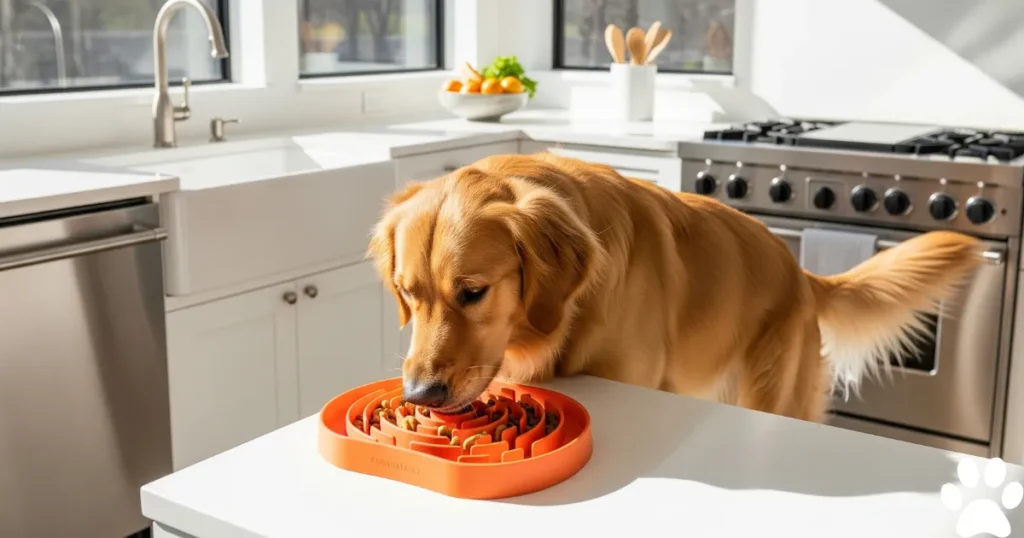
Timing of Meals and Exercise – Critical Prevention Tips
Nutrition is just as important as feeding your Golden Retriever. Often overlooked as Causes of Bloat in Golden Retrievers, poor nutrition and exercise play an important role in prevention. Understanding the connection between digestion and exercise is critical for how to avoid bloat in dogs.
Wait at least an hour before or after exercise
One of the most important rules for preventing bloat is to never feed your Golden Retriever immediately before or after exercise. A full stomach combined with physical activity, especially running, jumping, or vigorous play, can cause the stomach to move, stretch, and possibly twist. General Recommendation:
- Wait at least 60 minutes after exercise before feeding your dog.
- Also, wait 1-2 hours after eating before engaging in moderate to vigorous physical activity.
Real Life Scenarios That Increase Risk
Suppose your golden retriever eats a big breakfast and then runs outside to chase a ball. This may seem harmless, but it can cause bloat, especially if the dog drinks water afterwards.
Another common example: after a long walk on a hot day, the dog drinks a lot of water, eats, and then immediately collapses or becomes restless. These changes in activity and digestion can lead to gas and bloating.
Understanding the dog bloat timeline—how quickly gas symptoms can develop—underlines the importance of a timely approach. Symptoms can worsen within an hour, which is why preventative measures such as rest periods before and after meals are so important.
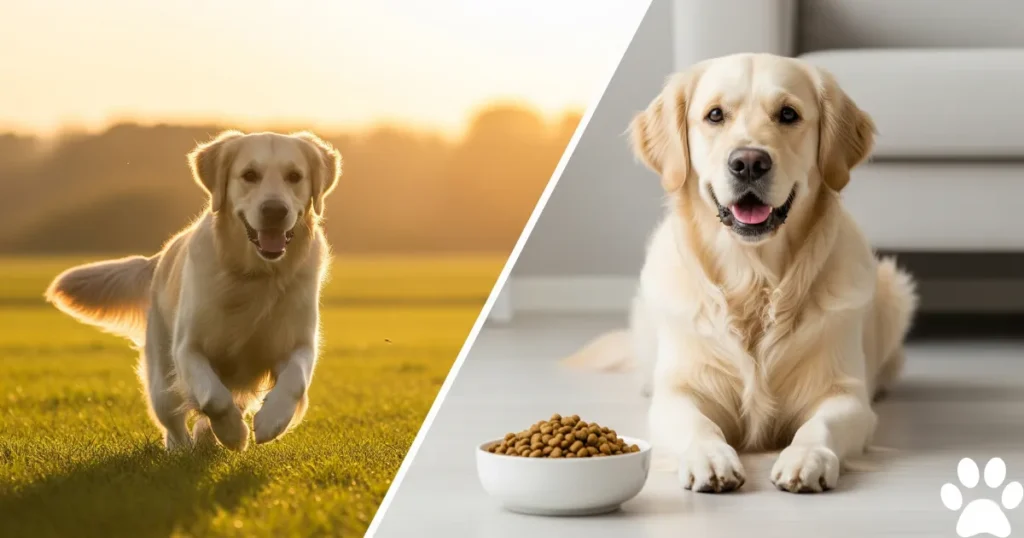
Importance of Proper Hydration (But Not Too Much!)
Water intake plays a crucial role in the health of your Golden Retriever. However, drinking too much water at the wrong time can be a hidden risk factor for bloat. While it may seem counterintuitive, excessive drinking, especially right after meals or intense exercise, can lead to both gastrointestinal issues and fluid retention. For all concerned pet owners who want to know how to prevent bloat in dogs, this is important information.
To prevent bloat in dogs, it is important to pay attention to even the smallest habits, and good water intake is one of them. Balanced water intake will help your Golden Retriever stay healthy without putting unnecessary strain on the digestive system.
Fresh Water Always, But Avoid Overdrinking Post-Meal or Post-Exercise
Your dog should have access to clean, fresh water throughout the day. However, drinking large amounts of water immediately after eating or exercising can lead to an upset stomach and fluid retention, a condition that is different from GDV but can still be serious. Learn more about the symptoms and risks of Water Bloat in Dogs in our guide.
Golden Retrievers tend to gulp water quickly, especially after play or in warm weather. This causes them to swallow more air and can cause dangerous bloat.
Tips for Managing Hydration Safely
- Offer your dog less water after eating or exercising – drink small sips rather than full bowls.
- Use water-resistant or spill-proof bowls to slow the flow of water.
- Never restrict water for long periods of time, but make sure water is available during meals and exercise.
- In hot weather, you can put ice cubes in the bowl to slow the flow of water and keep your dog cool.
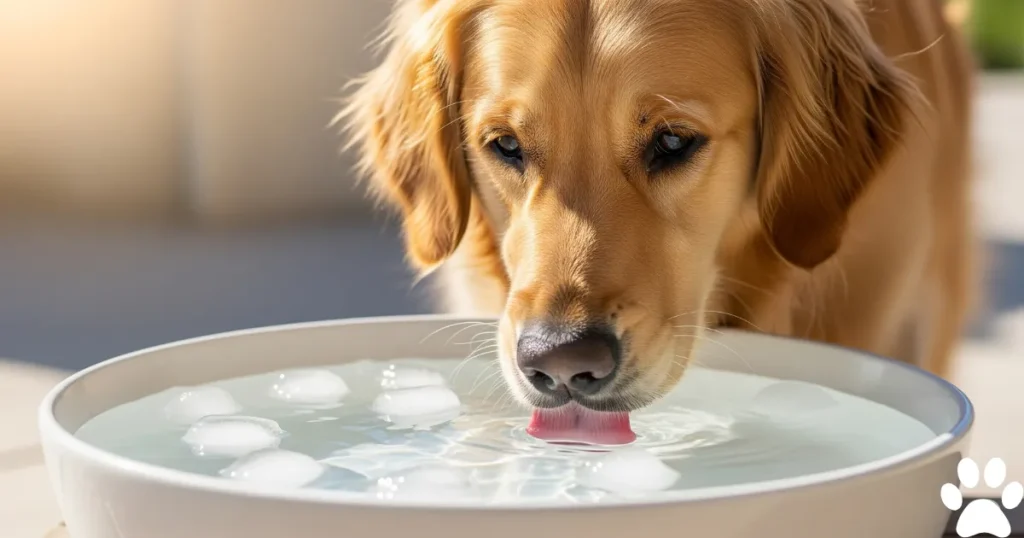
Stress and Anxiety – The Hidden Factors That Contribute to Bloat
While diet and exercise are obvious factors, stress and anxiety are often overlooked as potential causes of bloat in Golden Retrievers. Emotional stress not only affects behavior but also your dog’s digestion, increasing the risk of serious health issues like bloat. How to avoid bloat in dogs requires an understanding of this relationship between dogs and bloat.
How Stress Affects Digestion and Gut Health
When a Golden Retriever is anxious, their body produces stress hormones that can disrupt normal digestion and bowel movements. Stress can lead to rapid breathing or swallowing air (aerophagia), increased stomach acidity, or poor diet – all of which can contribute to bloating and a feeling of fullness.
Golden Retrievers are particularly sensitive to their environment and habits, and are therefore more prone to stress-related gastrointestinal problems than other breeds.
Practical Tips for Reducing Anxiety in Golden Retrievers
To reduce the risk of bloat in Golden Retrievers, minimize common stressors:
Separation Anxiety
Take short breaks and use calming aids (such as puzzles or background music).
Travel
Maintain a regular feeding schedule when traveling, and avoid feeding immediately before or after car rides.
Food Competition
If you have more than one dog, feed them separately to avoid restlessness and anxiety at mealtimes.
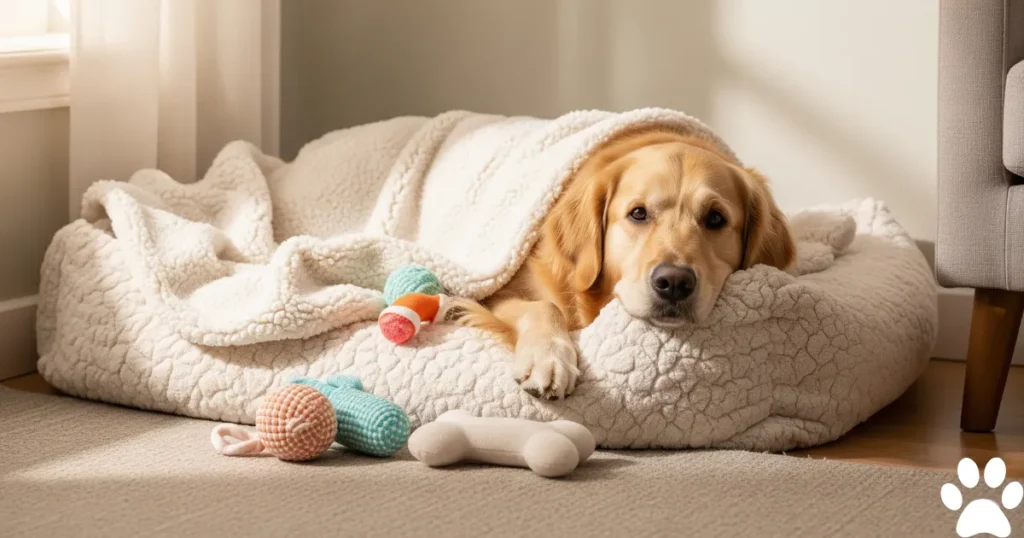
Veterinary Checkups and Preventative Surgeries (if needed)
How to prevent bloat in dogs, especially in at-risk breeds like Golden Retrievers, regular veterinary care and targeted interventions can be critical. Prevention doesn’t stop with daily measures – your veterinarian plays a vital role in identifying risk factors and developing advanced solutions.
The Importance of Regular Checkups
Routine veterinary checkups help detect early signs and monitor your Golden Retriever’s overall digestive health. During these visits, your veterinarian can assess factors such as body condition, eating behavior, and potential predisposition to bloat. Monitoring your Golden Retriever’s health through regular checkups can help avoid surprises and allow you to take early action if symptoms arise. Your veterinarian may also review your dog’s family history to determine if there is a genetic predisposition to bloat or GDV.
Is Prophylactic Gastropexy Right for Your Dog?
In some cases, especially dogs with a high genetic risk or a history of bloat, your veterinarian may recommend prophylactic gastropexy, a surgical procedure that secures the stomach to the abdominal wall to prevent bloat. This procedure is usually performed at the same time as castration.
While gastropexy does not prevent the stomach from filling with air, it can significantly reduce the risk of fatal Gastric Dilatation (GDV). It is one of the most effective methods for how to prevent bloat in dogs and should be taken seriously if your Golden Retriever is at high risk.
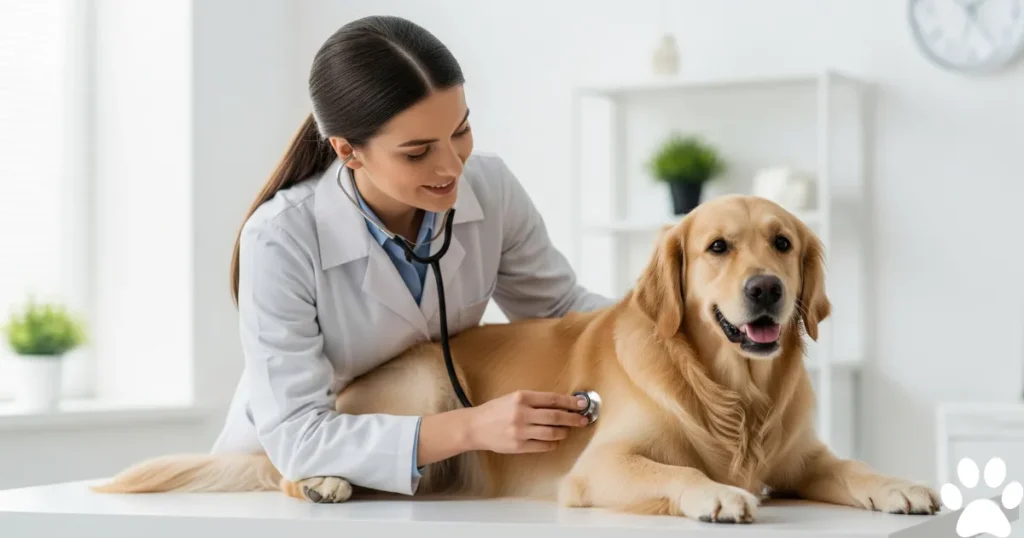
Checklist – Daily Habits to Prevent Bloat
Preventing bloat in your Golden Retriever doesn’t have to be complicated – it just requires daily attention and consistency. Use this checklist as a quick reference to refresh your knowledge of how to prevent bloat in dogs and reduce your risk of this dangerous condition.
✅ Daily Tips to Prevent Bloat:
- 🐶 Offer 2-3 small meals instead of one large one.
- 🐶 Use slow-motion bowls to prevent overeating.
- 🐶 Avoid using tall bowls unless recommended by your veterinarian.
- 🐶 Wait at least an hour before and after exercise before feeding.
- 🐶 Offer fresh water regularly, but limit water intake after meals or exercise.
- 🐶 Minimize stress by maintaining a calm routine and a quiet environment during mealtimes.
- 🐶 Watch for early Signs of Bloat in your Golden Retriever, such as gas or restlessness.
- 🐶 Visit your vet regularly and discuss preventative measures.
- 🐶 Consider gastropexy if your vet determines your dog is at high risk.
- 🐶 Understand the bloat timeline so that you may take prompt action.
Following these steps daily will help keep your Golden Retriever healthy, active, and safe. This is the foundation of how to avoid bloat in dogs and protect your pup from one of the most serious health problems in Golden Retrievers.
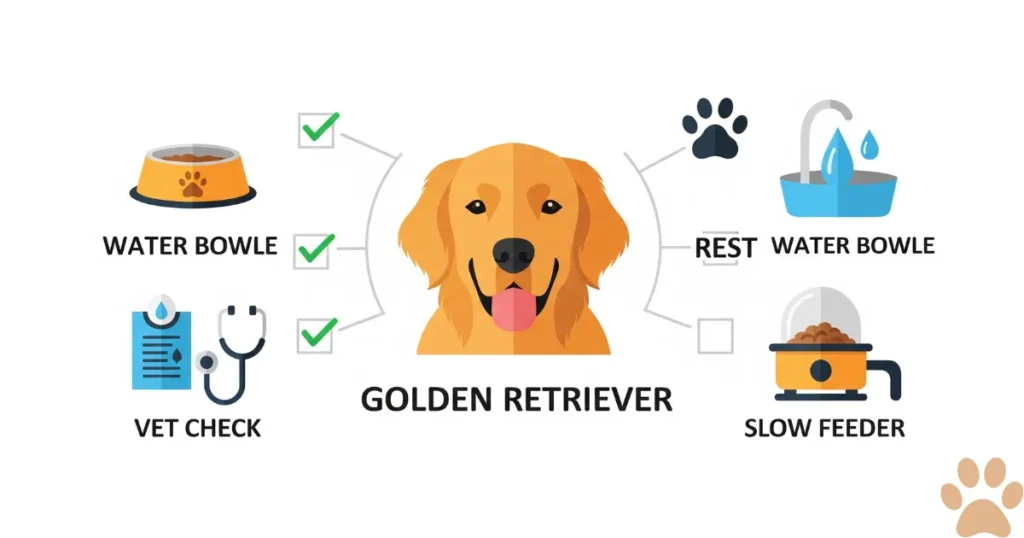
When to Act Fast – Emergency Symptoms of Bloat
Despite all efforts to prevent bloat, dogs can still experience bloat, and when it happens, every second counts. Early Signs of Bloat in Golden Retrievers can be a deciding factor.
🚨 Important signs that should never be ignored:
- Bloating or hardness of the stomach
- Non-productive vomiting (trying to induce vomiting, but nothing comes out)
- Excessive drooling or panting
- Fidgeting or inability to lie down comfortably
- Panting, whining, or signs of restlessness
- Rapid heartbeat or shallow breathing
- Posture or weakness
Final Thoughts: Protect your Golden Retriever!
Bloat in dogs is a dangerous and rapidly developing illness. However, with the right knowledge, you can take preventative measures to protect your Golden Retriever. From adjusting feeding and exercise to reducing stress and getting regular veterinary checkups, each habit can help on how to prevent bloat in dogs. Monitor behavioral changes, manage routines, and discuss your dog’s risk factors with your veterinarian. Prevention is the best defense.
Check out our complete guide to bloat in dogs and other articles about your pet to learn more about the causes, symptoms, and emergency measures. Your dog’s health is in your hands—protect him today.
Dr. Nabeel A.
Hi, I’m Dr. Nabeel Akram – a farm management professional by trade and a passionate Golden Retriever enthusiast at heart. With years of experience in animal science and livestock care, I’ve built a career around understanding animals—how they live, thrive, and bring value to our lives. This blog is a personal project born from that same passion, focusing on one of the most loyal and lovable breeds out there: the Golden Retriever. Whether I’m managing farm operations or sharing insights on canine health, behavior, and care, it all ties back to one core belief—animals deserve thoughtful, informed, and compassionate attention. Welcome to a space where professional expertise meets genuine love for dogs.
Facebook |
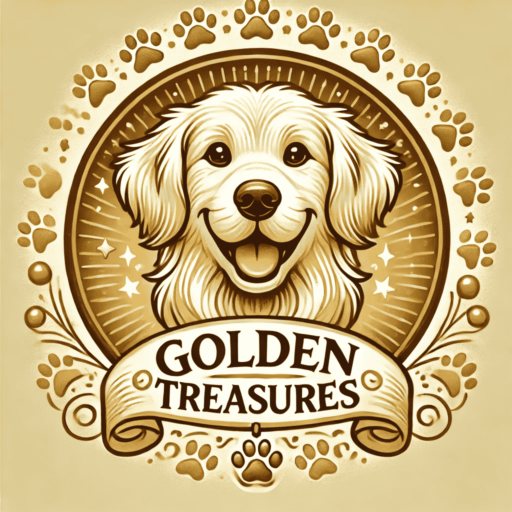
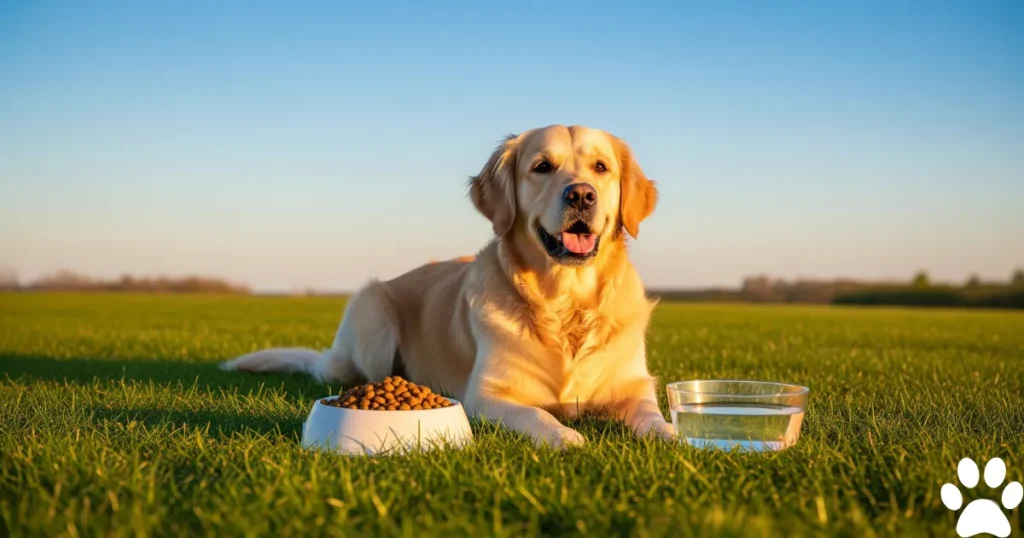
Links will be automatically removed from comments.